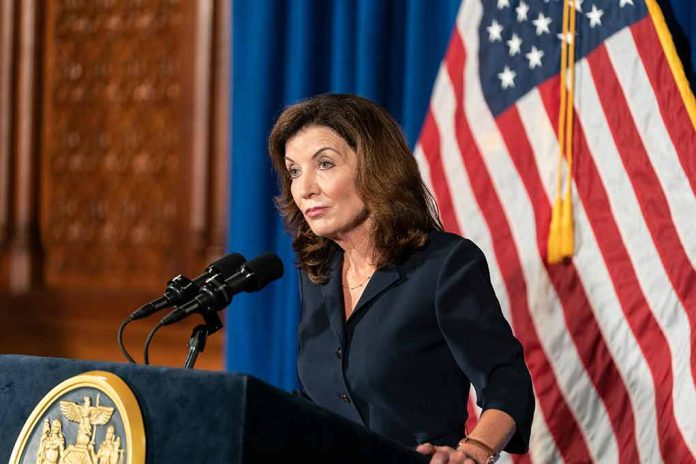
New York Governor Kathy Hochul is gearing up to propose legislation banning smartphones in schools, citing concerns over student mental health and academic performance.
At a Glance
- Gov. Hochul plans to introduce a bill banning smartphones in New York schools
- The ban aims to address social media addiction and improve student focus
- Flip phones may be allowed for emergency communication
- The proposal is part of a broader initiative to protect youth mental health
- Implementation details and timeline are still being developed
Hochul’s Push for a Smartphone-Free Classroom
Governor Kathy Hochul is taking a stand against the pervasive use of smartphones in New York schools. The governor is exploring ways to implement a ban on these devices during school hours, with plans to introduce legislation by next year. This initiative comes as part of a broader effort to address growing concerns about the impact of social media on youth mental health and academic performance.
Hochul’s proposed ban is not a complete communication blackout. The governor has suggested that students could still carry basic cell phones or “flip phones” for emergency contact with parents. This compromise aims to balance safety concerns with the need to create a more focused learning environment.
Gov. Hochul is again pushing for a cell phone ban in schools. We spoke with family members of students at East High School who are split on the issue. https://t.co/ENGNViqIUP
— News10NBC (@news10nbc) September 7, 2024
The Rationale Behind the Ban
The push for this ban stems from mounting evidence linking excessive smartphone and social media use to various mental health issues among young people. Gov. Hochul has been vocal about the addictive nature of these devices and their potential harm to students’ well-being and academic progress.
“They’re living in this dark place where there’s this FOMO — fear of missing out — that if they put down their device for one second, that someone might be saying something about them, or they’ve got to respond to something,” Hochul told reporters on Tuesday. “This is how addictive it is. We have to liberate them from this. We have to just draw a line now and say, ‘No. Enough is enough.'”
The governor’s concerns are echoed by educators and mental health professionals who have observed the negative effects of constant connectivity on students’ ability to focus, interact socially, and manage stress. By removing smartphones from the equation during school hours, Hochul hopes to create an environment more conducive to learning and healthy social interaction.
Support and Challenges
The proposed ban has garnered support from various quarters, including educators and parents’ groups. Julie Scelfo, founder of Mothers Against Media Addiction, strongly backs the potential legislation, emphasizing the detrimental impact of smartphones on education and social interaction.
“Smartphones have no place in the classroom,” she said in an emailed statement. “Educators, social workers and parents understand that the presence of phones during the school day impedes students’ social, emotional and academic growth and further fuels the current youth mental health crisis.”
However, the proposal also faces challenges. Implementation details, including enforcement mechanisms and potential exceptions, have yet to be ironed out. Additionally, some parents express concerns about maintaining communication with their children during emergencies.
A Broader Initiative for Youth Mental Health
The smartphone ban is part of a larger effort by Gov. Hochul’s administration to address youth mental health issues. In her 2024 State of the State address, the governor prioritized expanding youth mental health services and regulating harmful social media features. Two bills introduced in October aim to protect children online: the SAFE for Kids Act, which would require social media companies to limit addictive features, and the New York Child Data Protection Act, which would restrict the collection and use of personal data from minors for advertising without informed consent.
As the debate continues, Gov. Hochul plans to engage with teachers, families, and other stakeholders to refine the proposal. With no formal legislative action expected until the next session starting in January 2025, there is ample time for discussion and refinement of this potentially transformative policy for New York’s education system.







